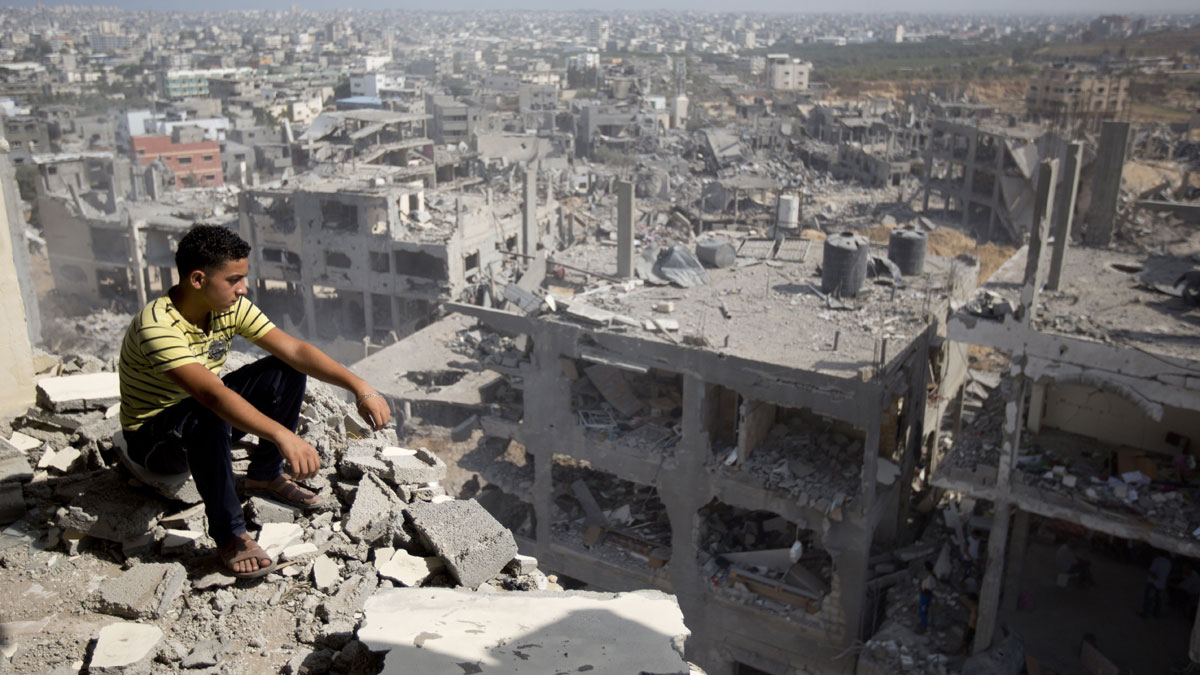Gaza could soon become 'uninhabitable', UN warns
Years of economic blockades and military assaults have left 'most of the population destitute'

A free daily email with the biggest news stories of the day – and the best features from TheWeek.com
You are now subscribed
Your newsletter sign-up was successful
The United Nations has issued a stark warning that Gaza could become uninhabitable in the next five years if current economic trends continue.
A report released by the UN Conference on Trade and Development says years of economic blockades by the Israeli government and three military operations in the last six years have sparked a process of "de-development" – where development is not just hindered, but reversed.
The conflict last year forced 500,000 residents to flee and destroyed more than 20,000 Palestinian homes, 148 schools and 15 hospitals. The region's power and water supplies remain badly damaged.
The Week
Escape your echo chamber. Get the facts behind the news, plus analysis from multiple perspectives.

Sign up for The Week's Free Newsletters
From our morning news briefing to a weekly Good News Newsletter, get the best of The Week delivered directly to your inbox.
From our morning news briefing to a weekly Good News Newsletter, get the best of The Week delivered directly to your inbox.
Gaza's economy saw negative economic growth of minus 0.4 per cent and unemployment reached a record 44 per cent last year, due "almost entirely" to a range of "discriminatory" economic policies imposed on it. These include the Israeli government withholding nearly $700m worth of Palestinian clearance revenue, earned from taxes on imports into Gaza.
The war "has effectively eliminated what was left of the middle class, sending almost all of the population into destitution and dependence on international humanitarian aid," the UN reports.
The Palestinian Centre for Human Rights says that while donor aid has been "very useful" to the Palestinian population, it needed to be paired with "real political policies" to have any lasting effect.
"The humanitarian catastrophe is man-made," deputy director Hamdi Shaqqura told Al Jazeera. "The answer is only through man-made policies."
A free daily email with the biggest news stories of the day – and the best features from TheWeek.com
On the one-year anniversary of the most recent conflict, The Week's Nigel Wilson reported that hope is yet to emerge from the rubble. "The nine-year economic blockade has been made worse by weak governance from within," he wrote.
"An intra-Palestinian dispute between the Palestinian Authority based in Ramallah, and Gaza's Hamas government, has all but stalled reconstruction and development in the coastal enclave since the war last summer."
-
 Health insurance: Premiums soar as ACA subsidies end
Health insurance: Premiums soar as ACA subsidies endFeature 1.4 million people have dropped coverage
-
 Anthropic: AI triggers the ‘SaaSpocalypse’
Anthropic: AI triggers the ‘SaaSpocalypse’Feature A grim reaper for software services?
-
 NIH director Bhattacharya tapped as acting CDC head
NIH director Bhattacharya tapped as acting CDC headSpeed Read Jay Bhattacharya, a critic of the CDC’s Covid-19 response, will now lead the Centers for Disease Control and Prevention
-
 Epstein files topple law CEO, roil UK government
Epstein files topple law CEO, roil UK governmentSpeed Read Peter Mandelson, Britain’s former ambassador to the US, is caught up in the scandal
-
 Iran and US prepare to meet after skirmishes
Iran and US prepare to meet after skirmishesSpeed Read The incident comes amid heightened tensions in the Middle East
-
 Israel retrieves final hostage’s body from Gaza
Israel retrieves final hostage’s body from GazaSpeed Read The 24-year-old police officer was killed during the initial Hamas attack
-
 China’s Xi targets top general in growing purge
China’s Xi targets top general in growing purgeSpeed Read Zhang Youxia is being investigated over ‘grave violations’ of the law
-
 Panama and Canada are negotiating over a crucial copper mine
Panama and Canada are negotiating over a crucial copper mineIn the Spotlight Panama is set to make a final decision on the mine this summer
-
 Why Greenland’s natural resources are nearly impossible to mine
Why Greenland’s natural resources are nearly impossible to mineThe Explainer The country’s natural landscape makes the task extremely difficult
-
 Iran cuts internet as protests escalate
Iran cuts internet as protests escalateSpeed Reada Government buildings across the country have been set on fire
-
 US nabs ‘shadow’ tanker claimed by Russia
US nabs ‘shadow’ tanker claimed by RussiaSpeed Read The ship was one of two vessels seized by the US military